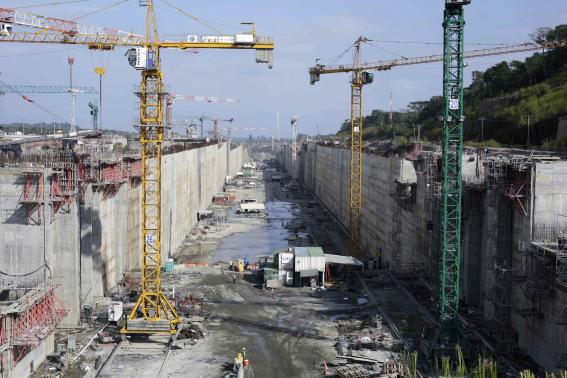A view of the construction site of the Panama Canal Expansion project on the Atlantic side on the outskirts of Colon City January 15, 2014.
Credit: REUTERS/Carlos Jasso
(Reuters) – The project to expand the Panama Canal, one of the world’s most important shipping routes, was in doubt on Wednesday after talks between the canal administrator and a Spanish-led building consortium fell apart and work ground to a halt.
Group United for the Canal, a consortium led by Spanish builder Sacyr, said in a statement that the government’s canal authority had broken off talks on who will pay some $1.6 billion needed to complete the ambitious project.
The Panama Canal Authority’s head, Jorge Quijano, said the canal has held general talks with other companies about work still pending on the expansion, but was open to more talks with the consortium. He said the canal authority has demanded that the consortium resume work on the expansion.
Quijano told a news conference the consortium had been “inflexible” and that the project would be completed in 2015 “with or without” it. He said talks had been complicated because another consortium member, Italy’s Salini Impregilo, had taken over the lead from Sacyr.
He said the canal was evaluating its next steps, but a deal was still possible.
“The distance between the parties remained too great, mainly because the (consortium) has acted against the interests of Panama and its canal,” Quijano said. “It doesn’t mean a deal is no longer possible, although the window is closing minute by minute.”
“What we are not going to permit is that the project be halted for an excessive period,” he said.
Any delay in the project would be a setback for companies worldwide eager to move larger ships through the Panama Canal, including liquefied natural gas (LNG) producers that want to ship from the U.S. Gulf Coast to Asian markets.
“We support the decision the Panama Canal has taken and we close ranks. What the (consortium) has done is irresponsible,” Panama’s president, Ricardo Martinelli, told local television. He said last month his country has the resources to complete the expansion even if talks end.
The failure of the talks was the latest setback to a project mired in disputes since the consortium, which also includes a Belgian and Panamanian firm, won a bid to double the capacity of the near 50-mile transoceanic cargo route.
Disagreements over cost overruns had already reached international arbitration and talks between the two sides over how to find the additional cash to finish the project had been extended twice.
The project was originally expected to cost about $5.25 billion, but the overruns could increase that to near $7 billion.
Asked if the relationship with the canal had broken down definitively, Sacyr CEO Manuel Manrique told Spanish radio: “No.”
Shares of Sacyr had risen as much as 6.8 percent on Tuesday in anticipation of a deal, but plunged more than 8 percent on the news on Wednesday before recovering some ground. Salini Impregilo’s shares were down more than 1.0 percent.
In its statement, GUPC – the Spanish acronym by which the consortium is known – said the suspension of discussions meant the canal expansion, and up to 10,000 local jobs, were at risk.
If the partnership between Panama and the builders is abandoned, it would likely mean further delays while Panama seeks financing and a new construction group.
If no agreement is reached soon, the canal authority could tell insurer Zurich North America that it wants to end the contract.
Zurich would then have 14 days to evaluate the request and decide if it will pay a $400 million bond for the completion of the project, go with other subcontractors, or otherwise assist the two groups to arrive at an agreement.
MONEY RUNS OUT
Disputes over the expansion of the Canal began soon after GUPC won the bid in 2009. At the time, officials and diplomats expressed concerns over the consortium’s ability to complete the project since its requested tab was $1 billion lower than that of the nearest competitor.
Over the past months, the two sides had been discussing how to fund the $1.6 billion needed to complete the project through a co-financing deal.
The GUPC said that, in its latest proposal, it offered $800 million in new and existing funds, while asking the Panama Canal to put in $100 million in funds. It also asked the Canal to extend the deadline by which the consortium needs to return $785 million in advance payments made by the Canal in order to free up cash.
“It is unjust and impossible for the PCA and Panama to expect that private companies will finance $1.6 billion in costs on a project that was to be fully funded by PCA,” the consortium said in the statement. It said the Panama Canal had not paid a pending $50 million invoice that had meant to cover salaries this week for subcontractors and workers.
The Panama Canal said it could not make the payment under Panamanian law because the consortium hadn’t filed necessary social security documentation. Canal officials said they would make the payment as soon as the documentation was filed.
For Sacyr, which has 48 percent of the consortium, the work brings in a quarter of its international revenue, helping it offset a sharp economic downturn at home.
Sacyr has provided 476 million euros in cash advances and guarantees to the project. One analyst said losing this would be the worst-case scenario for the builder if the project is lost.
“But the actual impact will only be determined after several years in the courts if there is no final agreement,” said Juan Carlos Calvo, analyst at Espirito Santo, adding that losing the contract would not represent a cash outflow for Sacyr as it would affect cash advances already paid.
(Additional reporting by Tracy Rucinski in Madrid and Alessandra Galloni in Rome; Editing by Simon Gardner, Kieran Murray, Bernadette Baum and Peter Galloway)
